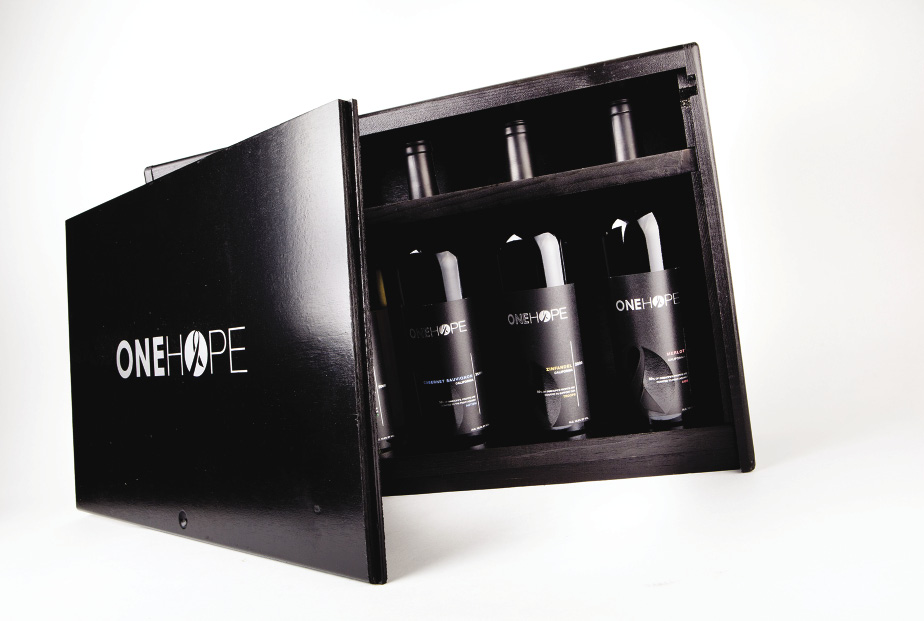


![]()
ONLINE
Cause-Centric Commerce
Editors’ Note
Jake Kloberdanz has been recognized by Businessweek as one of the “Top 25 under 25,” OC Metro’s “Top 40 Under 40,” and was the youngest nominee, in 2009, for Entrepreneur of the Year by Ernst & Young. Kloberdanz was a three-year Scholar Athlete at UC Berkeley, graduating from the Haas School of Business, and took home two national championships in college rugby. He has served over 5,000 volunteer hours since 2001 assisting charitable causes, and has been widely referred to as an expert in cause marketing and branding.
Company Brief
Since its inception in 2007, ONEHOPE Wine has grown rapidly to be a respected and positive presence in both the wine and nonprofit industries. Started by seven friends who were passionate about changing the world, ONEHOPE Wine was founded on the principle that giving back is good business. To date, ONEHOPE Wine has raised over $1 million for a wide range of charitable organizations, and donates half of its profits to partner nonprofits benefiting a variety of causes. The unique label is offered in thousands of reputable hotels, restaurants, bars, and retail stores in select markets across the nation, and can be purchased online at www.ONEHOPEWine.com.
How has your vision for the brand evolved?
The original vision was to create a brand that was about giving back to charitable causes. We decided to do this with wine because we felt it was such a perfect product, especially since it showed up at every nonprofit event and targets the same demographic as the nonprofits do. People choose wines like they choose nonprofits – they are passionate about them and want to tell their story.

ONEHOPE Wine
The wine was a great product to start out with. Along the way, we found that many other businesses wanted to emulate our business model and build impact into their business year-round. So we created a platform to empower other businesses to do what we call cause-centric commerce, through our foundation. It involves the entire consumer retail space and, hopefully, the business world in general. It has developed into a turnkey way for other businesses to give back.
This has been the biggest shift in paradigm. The day-to-day development of our own brand is just the first case study in what our long-term mission entails and that is to spread cause-centric commerce with the rest of the world.
Does your compelling purpose to benefit causes cloud the message as to your quality product?
This was one of the biggest challenges early on, but it becomes less of one as time passes. We have started to get 90-plus point ratings on our wines and have been winning medals at wine competitions. The more we’re featured in great restaurants, hotels, and retail outlets like Whole Foods, the less we have to battle for credibility.
In the beginning, we were a bit more aggressive in telling the cause story rather than focusing on our product being an equal or better value than its competition. We’re as good if not better than any of our competitors, but we also have the social component. When it comes to our wine, we knew we would have a quality product because we partnered with the Michael Mondavi family.
We have also begun to work with one of the best gourmet coffee producers in the world, which provides coffee for some of the top restaurants and accounts across the nation. Our customers increasingly understand that we’re a great, high-quality brand with a greater purpose in the things we do.
With all of the philanthropic need out there, how do you decide where to focus?
We work with a number of organizations, and have a different cause category for each varietal of wine, as well as for our coffee.
We make all of our decisions through ONEHOPE Foundation, which is a public charity. Our foundation’s Executive Director manages and governs what we do from a nonprofit partnership side, along with the independent foundation board.
We look at nonprofits based on a 13-point system, the first third of which is concerned with their 501(c)(3) status and whether they have been in existence for more than three years, for instance.
The second four points are about how we align with their management team, what their general cause is, and if the cause is national or local.
It’s also about how lean they are. We expect that 85 cents or more of each dollar goes to the cause versus the operations.
The last few standards are unique to us as a foundation. We measure the dollar-to-impact ratio, such as being able to quantify how many children $100 feeds, for example.
Since we focus on working with consumer and retail-oriented companies, it’s important to quantify that parameter for consumers, distributors, brokers, and all of our partners along the way.
How have you built product distri-
bution?
The majority of our distribution to date has been through partnerships with large-scale distributors. We are in all 50 states through 70 distributors domestically. We also opened up China and Canada, and continue to grow at a good pace in those countries. We’re looking into opening up in Europe as well. We do a significant amount of business through our direct channel, which is our Web site.
One of the most exciting parts is our third channel, and that is our team of salespeople who we refer to as event specialists. They do everything from at-home parties, to selling to companies and corporate events or weddings.
Do you reflect on what you have accomplished?
Entrepreneurs are their own toughest critics because they never feel it’s as big as they dreamt it; and it’s a moving target. If you have a championship attitude, you are consistently moving the standard for what you consider success. You are measuring yourself against your own expectations, not the competition. The biggest reflection of our success is the talent that we continue to attract to our team.•